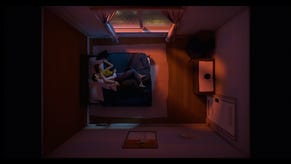Interview: Luis Antonio Talks Twelve Minutes
Against The Clock
We revealed Twelve Minutes this week - an extraordinarily interesting project, a game about a man trapped in a twelve minute time loop, trying to discover the reason why his wife is being accused of the murder of her father. And indeed why a policeman keeps kicking his head in. The game is already extremely impressive at its prototype phase, but creator Luis Antonio says there's a lot more work to do. We spoke to Antonio about how he taught himself programming to be able to make this game, where he wants to take it, and how he's not planning on releasing an early access version of the game.
RPS: There have been a few 'Groundhog Day' games before, but not many, and none that focus on the time loop concept so concisely. Having played Twelve Minutes, it feels like a game that should have existed forever - why do you think no one's done it this way before?
Luis Antonio: I have a feeling that even though its an interesting idea on paper, it’s not that easy to develop into actual gameplay without a lot of trial and error... something that studios most of the times cannot afford.
There have been some similar games that I really like - the brilliant Save The Date or Everyday the Same Dream - but I feel that even though they use the same concept, they approach it very differently.
I’m hoping I can live up to the potential of the idea and deliver a quality experience!
RPS: It's a bold move, setting a game in a three room apartment, in a twelve minute loop. You must have been very aware of the challenges such a confined space and time presents - how did you approach this as you began designing the game?
Luis Antonio: The core idea I wanted to explore was “cause and consequence”. A game where your actions will affect the people and the environment around you.
In my first concepts the game was supposed to last 24 hours and be a kind of free roaming, GTA style world, with big complex puzzles like causing traffic accidents to force a character to be late to work, or cause chaos at the supermarket to diverge police attention. Once I started to refine the idea I realized the consequences of your actions are too unclear and feel irrelevant on such a large scale. It is also a lot harder to provide clear feedback on what exactly you did that caused a change in the events (or to control the environment) in order to have meaningful effects.
I decided to reduce the gameplay space to a house, and it felt right... then an apartment... and then slowly removed more rooms and furniture until I was only left with the minimum required for the core gameplay.
This constraint also helped emphasize the natural claustrophobia of being stuck in a time loop and focus the player - something that would be hard to create in an open environment.
Once I realized this, I decided to try and compress everything else to the minimum so I’m only left with rich content and gameplay. It makes it easier for the player to understand what he can use, it allows me to create much more refined reactions from the world around them, and it makes the whole thing more stressful and hopefully fun to play.
The other element was the “real-time” aspect. It’s much easier for a player to manage 12 minutes rather than a full day, and if I wanted to do 24 hours I would have needed to speed them up.
RPS: There is so much that the player can do in the game already, including many red herrings. With such variation, and presumably more to be added, are you concerned that players may spend too much time focusing on a particular tactic that ultimately won't work? Or do you intend to create different solutions, different pathways that can be taken to still reach a conclusion?
Luis Antonio: My goal is to have different options that feel part of a natural progression. Not sure if you noticed in the prototype (and I don’t want to spoil anything) but some of the actions you have to do can be done much faster in a slightly different way. The more you understand the characters and the environments, the faster you will be able to do things.
Another area I want to explore is the emotional consequences of your actions. In the prototype you played there are hints of it, but I’ll only flesh it out once the core game is good enough. Everything else that happens in the apartment is for a reason, and if you decide to go on a tangent (the red herrings) you will learn more about the character and their backstory and this will help you later on.
RPS: One thing that particularly struck me about the game is something incredibly simple, but still something I don't think I've ever seen a game get right before: when you interfere in the patterns Sarah does each loop, the game adapts. Like, if I fill the soup bowls, she'll recognise it's happened and thank me for it, rather than go through the animation anyway with full bowls. I know this is such a tiny detail, but pretty much ever game ever has gotten it wrong. Let alone the complexity of all the different situations the cop has to be able to adapt to. Is it especially difficult to program for this? To have the game be able to adapt itself to my interference?
Luis Antonio: I find it very complex, but I think its mostly due to my inexperience as a programmer. Before I decided to build the prototype I tried many times to get programmers to join in on the idea. I would do the game design and art and they would do the programming. But even when I would find someone, it’s hard for them to stay motivated and work everyday after-hours on someone else’s project. This meant the only solution was to learn how to program. That by itself has been an amazing experience, but with a steep learning curve. I think what I’m trying to achieve in terms of story and puzzles is complex - but the programming behind it... not so much.
Along this process, I’ve come to realize that to find the right solution for a certain game design problem is a lot more work than the actual code implementation, and if your code starts to get very complex, it means you are doing something wrong. A few times I came up with incredibly complex gameplay situations where I was digging myself into a hole, and after going through the pain of programming and playtesting it I realized that it wasn’t the right solution. It would be too confusing for the player, or just didn’t fit with the game in general. The final solution always ended up being a lot more simple and elegant - and easier to program.
RPS: At the moment, the game presents a mystery, and lots of different ways to piece it together. But I know you want the game to be more than this, to say other things. What sorts of things do you want to say with it?
Luis Antonio: Video Games are all about repetition, learning patterns, timing, and memorization... and applying those principles, usually through trial and error. I wanted to create a game where that inherent nature of videogames is part of the gameplay. There are no “upgrades” or “new levels”... but real knowledge that you, the player, gets on each loop you go through.
I’m also trying to create an interesting layering of emotions where you are able to look back at the apartment, after 100 replays and see it in a much richer way.
I want Aaron, the character you control, react to what is happening around him. Right now it happens on a very basic level - but the idea is, just like the other characters in the game, the actions around him are affecting him so all the violence and stress he is going through are putting a toll on him.
The more knowledge you uncover and the more he suffers or is frustrated at each replay will change the way he deals with other actors. Maybe on your first replay he would kiss his wife and happily join her for dinner, but after 50 replays, he is throwing the dinner plate against the wall if he hears the same dialog line again. Overall I’m hoping that what engages the players is the emotions the characters are going through and not so much the actions that you do... but that you feel the consequences of your decisions and how numb someone would be from doing the same things over and over.
RPS: Even at this prototype level, the game is extremely playable, very coherent. Do you plan to wait until the game is entirely complete to release it, or have plans for releasing earlier versions, either to raise funds, or to allow beta feedback?
Luis Antonio: Unlike games like Minecraft I don’t think TWELVE MINUTES is the kind of game that would benefit from early access, since it will spoil the final product. I still need to figure out a way to get funding if I want to work on this full-time, but I’m not yet sure what the best way is. I’m planning to go to some events during the next year (GDC, PAX, IndieCade, etc.) to start creating some traction, and a feeling for how people react to the game. I like to believe that if the prototype is strong enough and it ends up being played by the right people, everything will fall into place and someone will want to help see it developed.
RPS: Thanks for your time.
You can keep up to date with the progress of Twelve Minutes via the game's development blog.








